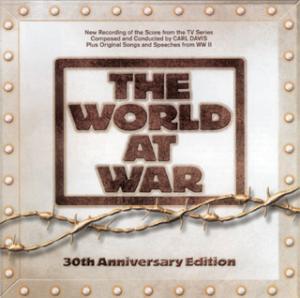The World At War 30th Anniversary Edition
Music composed by Carl Davis
Available on Silva Screen FILMCD370
Running time: 74.41
Score: 38.35
Songs and speeches: 36.06
Crotchet Amazon UK

- 01 Speech Neville Chamberlain (0:44)
- 02 The World At War Theme & German March (3:56)
- 03 Gracie Fields Wish Me Luck As You Wave Me Goodbye (2:34)
- 04 Arthur Askey Were Gonna Hang Out The Washing On The Siefried Line (2:33)
- 05 Charles Trenet Boum (2:32)
- 06 France Falls Suite (10:50)
- 07 Speech Winston Churchill (0:31)
- 08 The Billy Cotton Band Adolf (2:46)
- 09 Lale Anderson Lili Marlene (3:14)
- 10 Red Star (4:07)
- 11 The Red Army Choir The Red Army Is The Strongest (2:41)
- 12 Speech Field Marshal Montgomery (0:28)
- 13 Irving Berlin This Is The Army. Mr. Jones (2:19)
- 14 G.I.Blues (3:05)
- 15 Anne Shelton Coming In On A Wing And A Prayer (2:44)
- 16 Speech General Eisenhower (0:21)
- 17 Arnhem Airlift (1:03)
- 18 Warsaw Aftermath (2:34)
- 19 Flanagan And Allen Run Rabbit Run (2:44)
- 20 Carrol Gibbons Im Going To Get Lit Up (When The Lights Go On Up London) (2:32)
- 21 Turkey Shoot (4:43)
- 22 Vera Lynn When They Sound The Last "All Clear" (3:21)
- 23 Noel Coward London Pride
- 24 Blood, Sweat And Tears (3:46)
- 25 Speech Winston Curchill (0:23)
- 26 Reckoning (3:20)
- 27 The World At War Theme (1:07)
This album is not a reissue of the original 1973 soundtrack to the epic 26 part television documentary originally shown on ITV in 1973, but a new recording with the composer Carl Davis conducting his score with the City of Prague Philharmonic, interspersed with songs and speeches from the era. As a note by producer James Fitzpatrick explains, "some time was spent over whether to keep the songs and score separate. But in the end it was decided to merge these elements together, in a very approximate chronological order, to give a true musical and audio picture and souvenir of The World at War." Thus those looking for both a reminder of the TV series and a nostalgic evocation of the War itself should be satisfied, while film music devotees simply in search of Carl Davis score may find themselves having recourse to programming selected tracks. In the end the decision taken probably makes greater sense, and ultimately it doesnt matter much either way, because the music is still here.
Indeed, there is the same score as recorded for the original album, plus some new selections compiled by the composer from his original scores. Davis notes that he stayed with the orchestration of the four movements arranged for the 1973 album "no flutes, no trumpets, no harps rather austere I liked it!" but then sifted through the scores for further material for the new album. He comments, "The third episode, The Fall of France, seemed to me particularly cohesive and I thought it would be interesting to have at least one complete episode and this was the one where the score seemed to tell the whole story." He also included among his newly chosen selections the Mazurka written for the Polish Uprising sequence and the "Turkey Shoot" from the air war in the Pacific.
The album opens and closes with the famous World at War theme, the disc beginning with an extended concert version and closing with the TV version. All the horror, torment and resignation of war seems to be captured in this theme, which anyone who has seen the series will never forget. "Red Star" and "G.I. Blues" set melodies used variously throughout the series to evoke the Russian and American forces, "Warsaw Aftermath" meanwhile offers a bleak melody evoking sheer desolation, the piano offering a ghost of Chopin, the violins a twisted Jewish lament. It is strong underscore, yet its the classic main theme which leaves the most indelible impression.
The period songs are well chosen, and the extracts from famous broadcasts make the disc an effective evocation of the period. The sound of the new and old recordings has been mixed together as seamlessly as possible and the older material generally sounds excellent. A most commendable revitalisation of a landmark television score.
Gary Dalkin
31/2
Return to Index